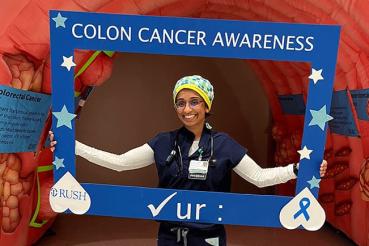Stress — it happens to all of us. It can be short-term or long-term, but for some stress can cause painful and embarrassing gastrointestinal (GI) issues.
So how do you know if what you’re experiencing is related to stress or a physical condition?
We talked with Garth Swanson, MD, a gastroenterologist at Rush, about what common stress-induced GI symptoms look like, which symptoms might indicate an underlying health issue and what you can do to feel better.
Common GI symptoms
Stress-induced gastrointestinal symptoms are more common than you may think. According to Swanson, 20% to 40% of the population will at some point experience GI pain or discomfort brought on by stress.
These symptoms include abdominal pain, diarrhea, constipation, gas, bloating and nausea. They can occur before or after a stressful event, but more often than not, there is no direct correlation or clear stressor that causes them.
These types of symptoms can also worsen the cycle of stress. You might be feeling stressed, start feeling bad, then stress even more because you don’t feel well.
How to get relief from your GI symptoms
“If you’re experiencing GI symptoms that you think are related to stress,” Swanson says, “try first addressing the factors in your life that you think may be causing your stress.”
One way to do that is to get professional help. Rush Connect Virtual Urgent Care offers stress support through video visits. You can talk with a provider about your stress-related symptoms and receive support and, if needed, referrals.
If you’re experiencing anxiety or depression, you can also talk to your doctor about prescription treatment options. According to Swanson, GI symptoms that are related to anxiety or depression can improve after you start taking antidepressants or selective serotonin reuptake inhibitors (SSRIs).
And look for ways to combat stress in your daily life — anything that helps you relax, whether it’s meditation, deep breathing, listening to music, cooking, gardening, reading or something else. Try to carve out a little time each day for soothing self-care.
Perhaps the best stress-buster is exercise. Getting 30 minutes or more of daily exercise can also help you maintain a healthy weight, improve your mood and reduce your risk of chronic health issues.
And as a bonus, physical activity may also relieve some of your GI symptoms. It stimulates the gut and increases activity in the intestines, which can help with constipation, gas and bloating.
When to be concerned about GI symptoms
While many people experience stress-induced GI symptoms, it’s important to know when the cause is likely something more. For instance, if you’ve been sick for a week with vomiting and diarrhea, you probably have a viral or bacterial infection (gastroenteritis, or the stomach flu).
But the issue could also be a GI disease. “With GI disease, we look for what we call ‘red flag symptoms,’ ” Swanson says. “These are different than typical stress-related symptoms. Red flag symptoms are worrisome things such as blood in your stool, severe weight loss, or diarrhea that wakes you up during the night.”
If you’ve been having red flag symptoms on and off for a few years, it’s more likely a GI disease than stress, says Swanson, and you should talk to your primary care doctor. Additionally, if you’re over the age of 60 and experience a sudden change in your GI symptoms, let your doctor know — they may want to refer you to a gastroenterologist for evaluation.
If you’ve been having 'red flag symptoms' on and off for a few years, it’s more likely a GI disease than stress.
Common GI diseases
There isn’t one test that can definitively diagnose GI diseases. “They are often diagnosed by exclusion — when tests for all other conditions are negative and your symptoms still persist,” Swanson explains.
However, you can distinguish between common GI diseases by looking at the different symptoms, as well as the severity and timing of those symptoms. Here are some common GI diseases and the symptoms they typically cause:
- Ulcerative colitis affects the rectum and most commonly causes blood in your stool as well as frequent urgency (feeling like you have to rush to the bathroom).
- Crohn’s disease usually causes diarrhea and weight loss and may also cause a long history of indolent (causing little or no pain) symptoms.
- Irritable bowel syndrome has two subtypes, diarrhea and constipation. You might have one of the subtypes or a mix of both. Constipation tends to be the most common, but with both subtypes you’ll also have a long history of symptoms, or intermittent episodes of constipation with gas and bloating.
- Gastroesophageal reflux disease (GERD) affects the upper GI tract, typically causing gastric burning and discomfort, or the sensation of a lump in your throat.
How to prevent GI disease
While there’s no single thing you can do to prevent a GI disease, managing stress and having a good diet are two key ways to improve your gut health, says Swanson.
A gut-healthy diet is rich in healthy probiotic foods (e.g., yogurt, kimchi), high-fiber fruits, veggies and whole grains, and low in processed, fried, sugary or fatty foods, as well as red meat.
And if you’re over the age of 50 or at a higher risk of colon cancer, you should get a colonoscopy every year (or at a frequency recommended by your doctor) to screen for issues.
GI diseases may also be affected by genetic and environmental factors. Talk to your family to understand if you’re at risk for GI diseases based on your family history. And talk with your doctor about reducing environmental factors that may be harmful to you.
If you need stress support or want to seek care for your GI symptoms, make an appointment at Rush.





